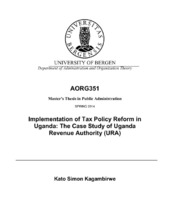| dc.description.abstract | In this study I examined the implementation of tax policy reforms at Uganda Revenue Authority. In particular, I examined the impact of the tax policy reforms implemented since the restructuring of Uganda Revenue Authority in 2005. Although Uganda's taxation system is a vital area of study, it has not gotten enough attention from researchers. This is because, in the Ugandan and generally African developing countries context, taxation involves vital and, to a large extent, sensitive issues which relate to auditing and accountability which all contribute to the healthy being of the state, both socially, politically and economically. This study was therefore aimed at assessing the extent at which implementation of tax policy reforms has been successful since URAs restructuring in 2005. In this study I employed the implementation theory advanced by Van Horn & Van Meter (1975) and Winter's intergovernmental model to provide a framework of analysis as I engaged the impact of tax policy reforms at URA against a number of challenges related to the very essence of implementing tax reforms. The main variables I used in my analysis are policy standards and objectives, resources, social economic and political conditions, disposition of implementers, inter organization communication and enforcement activity. The major findings of this study show that URA employees have adequate knowledge of the goals and objectives of implementation of tax policy reforms in comparison to the situation before 2005; due to continuous professional training of staff. Also, policy standards and objectives, resources, social economic and political conditions, provide a higher explanatory power in affecting the dependent variable, the implementation of tax policy reform, better than disposition of implementers, inter organization communication and enforcement activity. However, the study further established that the major challenges which affect effective implementation of tax reform at URA are lack of enough skilled manpower, poor internet connection at URA, low literacy levels of taxpayers, poor motivation of staff, limited funds to effectively implement tax reforms and low levels of tax compliance by taxpayers. The overall finding of this study is that for effective implementation of tax policy reforms, URA as an organization must be committed to fulfilling its main goals and objectives. URA ought to be free from political influence and its management and general staff must work within the prescribed legal framework so as to realize effective implementation of the reforms. In line with the preceding findings, the study established that since 2005 URA has to a significant extent been steadily operating outside mostly political influence and militarism, thus limiting the level of corruption, impunity and tax avoidance. The overall impact is that URA has realized a steady growth since its restructuring in 2005 | en_US |
